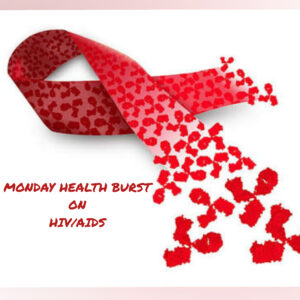MONDAY HEALTH BURST – HIV/AIDS (INTRODUCTION)

HIV (Human Immunodeficiency Virus) is a sexually transmitted infection (STI) which can be transmitted through contact with infected blood, semen or vaginal fluids. According to Institute of Human Virology, AIDS (Acquired Immune Deficiency Syndrome) is the final and most serious stage of HIV disease, which causes severe damage to the immune system, leaving the body vulnerable to a variety of life-threatening illnesses like Cancer.
Centre for Disease Control (CDC) reports that about 47 million people worldwide have been infected with HIV since the start of the epidemic, and it is the fifth leading cause of death among persons between ages 25 and 44 in the United States. According to United Nations AIDS (UNAIDS), Nigeria has the second largest HIV epidemic in the world and one of the highest rates of new infection in sub-Saharan Africa. Also in 2019 alone, 45,000 people died from AIDS-related illnesses in Nigeria.
There are several means of HIV transmission like the mother to child during pregnancy, childbirth or breast-feeding, but the most common ways that HIV is passed from person to person include sexual contact with infected persons and sharing of needles or syringes. In recent times, a cure has been said to be found from stem cell therapy according to researchers from University College London, but this is not widely used yet. So, medications are used to dramatically slow the progression of the disease.
Monday Health Burst is an initiative of Centre for Family Health Initiative (CFHI) to tackle issues of basic health concerns. Join us next week for details on HIV/AIDS prevention, care, and CFHI’s intervention in curbing this menace.
#WorldAIDSDay2020.


